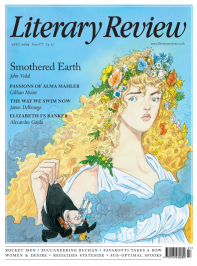David Annand
Marine Life
The Volunteer
By Salvatore Scibona
Jonathan Cape 432pp £16.99
There’s a doubleness to the act of volunteering. On the face of it, by freely offering to do something you’re acting as an autonomous agent. But in practice, the act of volunteering is very often a response to something beyond your control: the poverty that necessitates charity, the global conflicts that demand recruits, and so on. To volunteer is to act in a way that both affirms the self and also confirms its insignificance.
So it is with the characters of Salvatore Scibona’s brilliant second novel, tempest-tossed people who stumble about the edges of American life trying vainly to assert some sense of order over their lives as they bounce from one bad break to another. At the centre of it all

Sign Up to our newsletter
Receive free articles, highlights from the archive, news, details of prizes, and much more.@Lit_Review
Follow Literary Review on Twitter
Twitter Feed
It wasn’t until 1825 that Pepys’s diary became available for the first time. How it was eventually decrypted and published is a story of subterfuge and duplicity.
Kate Loveman tells the tale.
Kate Loveman - Publishing Pepys
Kate Loveman: Publishing Pepys
literaryreview.co.uk
Arthur Christopher Benson was a pillar of the Edwardian establishment. He was supremely well connected. As his newly published diaries reveal, he was also riotously indiscreet.
Piers Brendon compares Benson’s journals to others from the 20th century.
Piers Brendon - Land of Dopes & Tories
Piers Brendon: Land of Dopes & Tories - The Benson Diaries: Selections from the Diary of Arthur Christopher Benson by Eamon Duffy & Ronald Hyam (edd)
literaryreview.co.uk
Of the siblings Gwen and Augustus John, it is Augustus who has commanded most attention from collectors and connoisseurs.
Was he really the finer artist, asks Tanya Harrod, or is it time Gwen emerged from her brother’s shadow?
Tanya Harrod - Cut from the Same Canvas
Tanya Harrod: Cut from the Same Canvas - Artists, Siblings, Visionaries: The Lives and Loves of Gwen and Augustus John by Judith Mackrell
literaryreview.co.uk